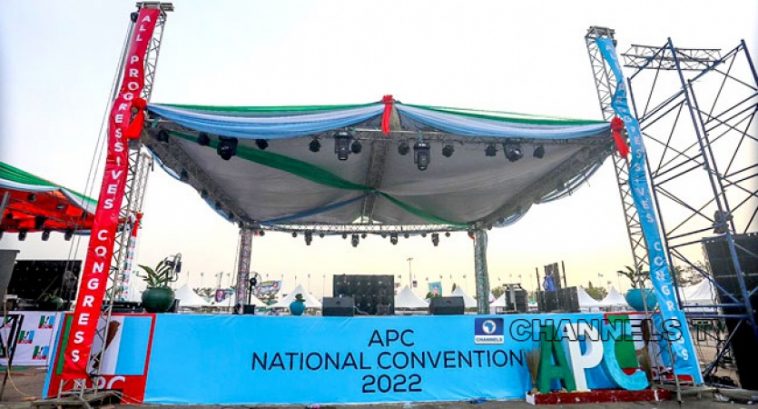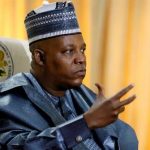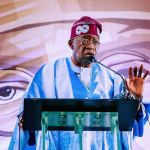The composition of the delegates that will elect the presidential candidate of the ruling All Progressives Congress on June 6, 2022 remains a subject of controversy as a Federal High Court in Kano State, on Friday, ruled that Section 84 of the Electoral Act did not prevent statutory delegates from voting.
The National Assembly had last month amended Section 84(8) of the Electoral Act to permit automatic or statutory delegates to vote in primaries. This is based on the interpretation that Section 84(8) only permits elected delegates from taking part in primaries. But the President, Major General Muhammadu Buhari (retd.), refused to sign the amendment.
Subsection 8, which is subsisting, reads, “A political party that adopts the system of indirect primaries for the choice of its candidate shall clearly outline in its constitution and rule the procedure for the democratic election of delegates to vote at the convention, congress or meeting.”
Statutory delegates, whom the amendment was seeking to include in the Electoral Act, include persons holding executive positions in the party and members of the party elected into public offices.
For the APC, the statutory delegates include the President, Vice-President Yemi Osinbajo, sitting and former National Assembly members, serving and former governors and their deputies, National Working Committee members, state party chairmen and secretaries, local government chairmen, their deputies, councillors and party chairmen in the 774 local government areas.
But in a suit marked FHC/KN/CS/137/2022 instituted by an ex-lawmaker, Senator Mas’Ud Doguwa; and two others, Habibu Sani and Biliyaminu Shinkafi, the plaintiffs in an originating summons asked the court to determine if Section 84(8) of the Act actually bars statutory delegates from voting.
Those listed as respondents in the suit are the Senate President, the National Chairman of the APC, the Speaker of the House of Representatives and the Independent National Electoral Commission.
Delivering judgment in the suit, Justice Abdullahi Liman stated, “That Section 84(8) cannot be interpreted to have excluded statutory delegates from voting at the convention, congress or meeting by virtue of Section 223 of the 1999 Constitution (as amended) and Article 20(iv)(c) of the All Progressives Congress constitution, which allow statutory delegates to vote at convention, congress or meeting.”
Already, the APC has elected three delegates each from the 774 local government areas in the country and the six area councils in the Federal Capital Territory, Abuja, bringing the total to 2,340 delegates.
This arrangement is believed to have put some strategic states like Lagos at a disadvantage as it has only 20 LGAs and will be entitled to just 60 delegates, while a state like Kano, which has 44 LGAs, will be entitled to 132 delegates.
Should the statutory delegates be allowed to vote, the number of delegates is expected to increase to about 7, 800 with Lagos State being in the top four alongside Kano, Katsina and Osun states.
Attempts to get a response from the APC proved abortive as its National Chairman, Senator Abdullahi Adamu, neither responded to calls nor a text message sent to him on Friday.
We’re yet to get court judgment – INEC
Meanwhile, INEC said on Friday that it had yet to receive any court judgment.
Kayode Oyekanmi, the spokesperson for the INEC Chairman, Prof Mahmood Yakubu, told one of our correspondents in an interview that he was not aware of the judgment.
“If the court gave the judgment today (Friday), I’m not sure it has reached our headquarters. If it gets there, it will be processed normally. INEC complies with court judgments. Note that primary is the business of political parties. What INEC does is to monitor the process and ensure that they comply with extant laws; the Electoral Act and the constitution.”
Panel silent on 10 disqualified aspirants
In the meantime, the party’s presidential screening committee submitted its report on Friday.
The Chairman of the committee, Chief John Odigie-Oyegun, who submitted the report to the APC National Chairman, Senator Abdullahi Adamu, said only 13 out of the 23 aspirants who presented themselves for screening were shortlisted.
Oyegun, who is a former national chairman of the party, said, “The basic constitutional qualification for you to aspire to be a President of the Federal Republic of Nigeria is simple and straightforward. And on that basis, every single aspirant that presented themselves qualified, because it was basic and simple.
He stated, “But we are a governing party and we are keen on continuing the process and replacing, at the proper time, our President with yet another member of the party. So, the ability to lead, background, experience, understanding of the Nigerian situation, ideas as to how issues, difficulties and problems can be addressed, and how the country can be moved forward, became a critical consideration.
“It is on that basis – who are you, what have you achieved, what is your understanding of the nation and what you think you can contribute to move the nation forward – it was on the basis of that that we made our final shortlist.
“I don’t want to list the names. I’m going to leave that to you. But we have a shortlist, which brought the number severely down to 13. We could have cut it a little shorter, but we wanted a pedigree of younger elements to surface, for them to be seen, for them to be noticed, and who knows? We hand them over to the party and it is for the party to decide who the preferred candidate will be.”
Oyegun said the screening committee engaged all the aspirants on the issue of consensus and that 99 per cent of them agreed to it except one aspirant, who said he would only accept if he emerged as the consensus candidate.
The committee chairman stated while submitting the report, “One part I need to emphasise is that we engaged every aspirant on the issue of consensus and it is a pleasant surprise that 98 to 99 per cent agreed that the party is supreme. And that whatever the party finally decides, with proper consultation, they are likely to accept.
“We had only one exception who said, ‘Yes, I will accept consensus so long as it is built on me’. I think it is a point that needs to be emphasised. So, that gives you a lot of leeway in the days and hours ahead to trim down even more drastically. But finally, we think we should not be afraid of a contested primary if anybody insists on the contest.”
Although he did not mention the aspirant who did not subscribe to the idea of consensus, many political analysts believed it could be a national leader of the party and former Lagos State governor, Asiwaju Bola Tinubu, whose camp had said repeatedly that he would prefer an open contest.
PUNCH






